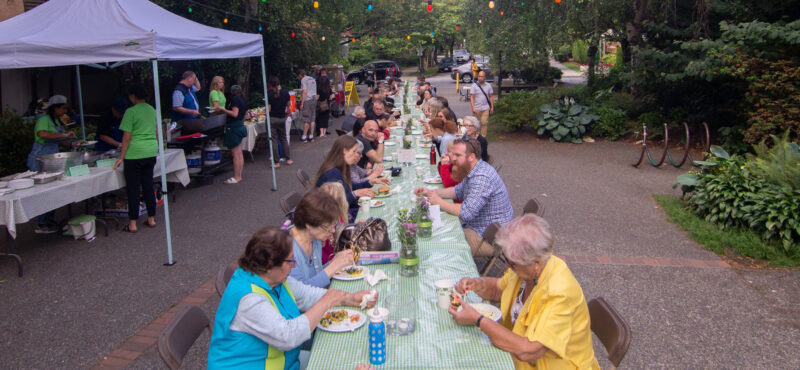Phone: 604-683-2554 | Email: welcome@gordonhouse.org
Planter Box Encourages Neighbours to Rethink Edible Native Plants

Over the winter months you may have noticed a new planter box with perennial plants and signage in front of Gordon Neighbourhood House. The project was created by West End neighbour Jesse Orr. Jesse is a multidisciplinary artist, farmer, gardener, and is engaged in community activism and social justice. Jesse volunteers with Gordon Neighbourhood House through our Young Ideas group.
The planter originated in the summer of 2020 as ‘Invite The Bees’, an installation of summer flowering native plants for the Vines Art Festival. After the success of the flowering plants installation, Jesse was keen to extend the project into the winter months, this time connecting native plants and landscaping to local food systems.
For thousands of years Indigenous people have thrived on locally-sourced ingredients, yet wider discussions around food security and local food systems tend to focus on Western European-centric diets. This narrow approach excludes Indigenous societies and ignores the ecological benefits of growing and eating native plants, which tend to use fewer resources and are more beneficial overall for other organisms.
Jesse’s aim is to combine art with the natural world in an interactive way that encourages neighbours to rethink native plants species in relation to their diet and gardens. She hopes that neighbours will taste the berries, learn the plant names, identify characteristics of these native species, and ultimately inspire others to consider introducing these plants into their gardens and planter boxes.
“I’m interested in local food for greater food security and for a lower carbon footprint in agriculture, but that conversation often focuses only on a Western diet. I’m learning that what shouldn’t be forgotten is the fact that the pre-colonial ecology of this area was in itself a sustainable foodscape, shaped by local people, and that is a very different way of eating than mainstream agriculture provides. The work of Dawn Morrison and the Indigenous Food Systems Network over decades has done a lot to bring attention to this colonial frame which tends to dominate the food systems topic.” – Jesse Orr
Further Resources:
The Environmental Youth Alliance is doing a lot of cool work around appreciating local plants (many which are commonly called weeds) and ecology. Follow the link to find out more about this project – Re-wilding Vancouver.
Fraser Valley Conservancy has created a major resource that provides a step by step guide to creating your own backyard eco-system.
Check out this news article about gardening with local food-bearing plants.
Dawn Morrison of the Indigenous Food Systems Network, along with a panel of experts, partnered with UBC to host a webinar titled ‘Decolonizing the Land and Food Systems’ available to view here.
First We Eat is a documentary about a family living in Dawson City, Yukon on the traditional territory of the Tr’ondëk Hwëch’in. This family embarks on a year long goal of eating only locally sourced food, and share what they learned in the process such as tips on foraging, recipes, and other interesting information.
Taste the berries!
All neighbours are invited to come by and check out this installation. Please be mindful of physical distancing, mask wearing, and Honourable Harvest Teachings, as the plants are for the whole community to enjoy and learn from.
Please reach out if you are interested in obtaining one of these plants for your own garden, local vendors include Art’s Nursery and Figaro’s Garden.

Bunchberry (edible berries)

Licorice Fern (edible & medicinal)

Oval-Leaved Blueberry (edible berries)

Salal (edible berries)






